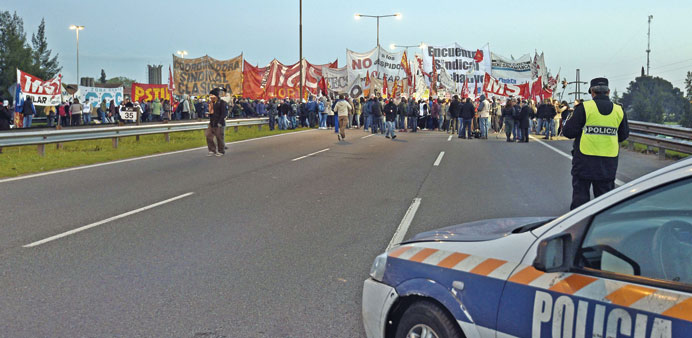Reuters/AFP/Buenos Aires
Argentine opposition labour unions staged their second general strike this year yesterday to protest against soaring inflation and job cuts, slamming the brakes on business activity and bringing the Rosario grains export hub to a near standstill.
Latin America’s third largest economy is mired in a recession that is set to worsen after its default last month as pressure on the peso currency builds, investment withers and borrowing costs for companies and provinces rise.
The 24-hour strike called by the powerful CGT labour organisation impacted trains, air transport, gas stations and public administration.
“The reasons (for the strike) are suspensions, job cuts ... and we are also raising the issue of the income tax and the reopening of wage talks,” said Ruben Sobrero, a leader of the rail workers trade union.
Accelerating inflation is pushing workers into higher income tax brackets although their wages are not rising in real terms.
The Argentine economy slipped into recession in the first quarter as both industry and private consumption dropped.
The country has one of the world’s highest inflation rates, currently running at more than 30%, according to private economists.
Officially, the peso is worth about 12 US cents, but on the black market that determines Argentines’ real import power it fetches just 7¢.
Union members and radical activists barricaded the major roads into Buenos Aires and blocked buses and taxis whose drivers were not observing the strike, the second in less than five months.
The strike appeared to be only a partial success.
The streets of Buenos Aires were quiet but not empty, with buses and taxis running, as well as half the capital’s six subway lines.
But the walkout shut down key sectors including banks and domestic flights.
“If our demands are not listened to, then there will be another strike of 48 hours in September,” Sobrero said.
About 80% of Argentine grains and oilseeds leave from Rosario, located on the Parana River.
Unionised workers are needed to manage the entrance and exit of each ship from the constellation of ports that make up the Rosario hub.
Port workers have staged many walkouts at Rosario over the past few months, slowing trade.
Analysts fear social unrest could grow as the default lengthens, darkening the economic outlook.
Argentina slipped into default again in July after a US court blocked a coupon payment owed to holders of debt that was restructured after the country’s record default in 2002 on $100bn in debt.
The US court said that Argentina could only service its debt if it also paid the so-called holdouts who rejected its restructuring.
Argentine Cabinet Chief Jorge Capitanich said the strike was politically-motivated due to general elections next year, saying only 25% of workers had joined the protest.
Labour groups staged their first general strike this year on April 10 but Argentina’s economic situation has worsened since then.

Demonstrators block the Pan-American Highway in Buenos Aires yesterday during the general strike in Argentina.
